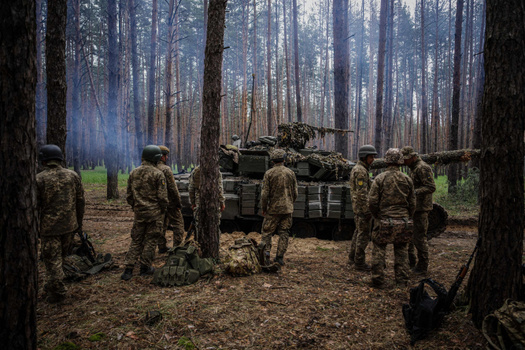
‘If Ukraine succeeds, it should be explainable’ How Moscow is instructing Russian propaganda outlets to cover Kyiv’s looming counteroffensive
Мы рассказываем честно не только про войну. Скачайте приложение.
The Ukrainian military is widely expected to launch its spring counteroffensive any day now, though what approach it will take and how the situation will unfold is anyone’s guess. According to Zelensky administration adviser Mykhailo Podolyak, Moscow’s anxiety surrounding the war’s next stage is one reason the Russian army has increasingly launched missiles at civilian targets in recent days: the sooner Ukraine can be provoked into starting the offensive, the less prepared it will be. New guidelines sent by the Putin administration to Russia’s pro-government media outlets and obtained by Meduza confirm that the Kremlin is preparing for multiple scenarios. Meduza explains how the Russian authorities plan to use their propaganda apparatus to prepare citizens for what’s to come.
Meduza has obtained a copy of new guidelines compiled by the Putin administration for Russia’s propaganda media. Among other things, it includes the Kremlin’s instructions for how pro-government news outlets should report on Ukraine’s anticipated counteroffensive.
In the document, the Russian authorities tell reporters “not to downplay expectations for the NATO-supported counteroffensive that Ukraine has announced,” and not to assert that “Kyiv is unprepared for a ‘counteroffensive.’” On the contrary, says the guide, pro-Kremlin outlets should emphasize that Western countries are providing Kyiv with weapons and supporting Ukraine in various other ways.
Two sources close to the Putin administration told Meduza that there’s a simple explanation for why Moscow wants this kind of coverage:
If the offensive is a failure, [the Russian authorities] will be able to say that [Russia’s] army adeptly repelled an extremely powerful attack. The value of this victory will increase significantly.
If Ukraine, with the help of weapons from the U.S. and Europe, is successful and takes territory, the loss will be explainable, too; after all, the West has focused a tremendous amount of effort on the front, but its successes — when compared to those efforts — have been very modest. In other words, overall, the Russian army has held its own.
In the document, the Kremlin “advises” propagandists “not to focus on the amount of money” allocated from the Russian budget to rebuild infrastructure in the occupied and annexed Ukrainian territories. It’s unclear exactly how much money Russia has spent on these efforts, though the total is likely more than one trillion rubles ($12.5 billion); in the first quarter of 2023 alone, the country’s budget deficit amounted to 2.4 trillion rubles ($30 billion).
Instead, the guide urges the media to talk about how “problems are being solved” in Russia, such as by reporting on repairs in schools, kindergartens, and hospitals. According to the document, the Kremlin is confident that these are the kinds of segments that garner “public approval.”
“It’s clear that there will be [economic] problems, and it’s clear what will cause them. The expenditures on the ‘special military operation’ aren’t going anywhere. First and foremost, they’ll cut spending on the very same infrastructure [whose repairs they told the media to highlight]; they’ll be repairing things in the new regions while ignoring needs in the old ones. The reaction [among residents of Russia’s regions] is understandable: something was taken from us. Better not to show the specific amounts of money that were taken. That already happened with Crimea,” said one of Meduza’s sources close to the Putin administration.
This source’s account is consistent with data from a 2017 survey of Russians conducted by the independent Levada Center. At that time, a significant share of respondents (41 percent) said that investments in Crimea from Russia’s federal budget were being made “at the expense of spending on education, health care, science, wage indexation, and pensions.” More than half (55 percent) of respondents said that the Russian authorities were wrong to allocate money to Crimea that would otherwise have gone to social programs in Russia’s regions. Moreover, a poll from the state-owned Russian Public Opinion Research Center that year found that 84 percent of the public opposed additional financing for Crimea.
Another topic the guide discourages the pro-Kremlin media from covering is the rehearsals for Russia’s May 9 Victory Day parade. Some regions have opted to forego the holiday entirely “on security grounds.” Additionally, Moscow and multiple other cities plan not to hold their traditional “Immortal Regiment” processions (where people march with portraits of their ancestors who were somehow involved in Russia’s past wars). Meduza’s sources close to the Kremlin declined to comment on the reason for this decision.
One political scientist who works with the Russian authorities told Meduza that the changes aren’t due solely to safety concerns. In all likelihood, he said, this year’s parade will involve less military equipment than in past years, and the equipment that is featured will likely be outdated: “The modern vehicles are most likely needed at the front.”
Meduza cannot independently confirm these explanations, but the Kremlin’s guide does indeed “recommend” that the pro-government media “not play up” the topic of the authorities’ Victory Day preparations.
Story by Andrey Pertsev